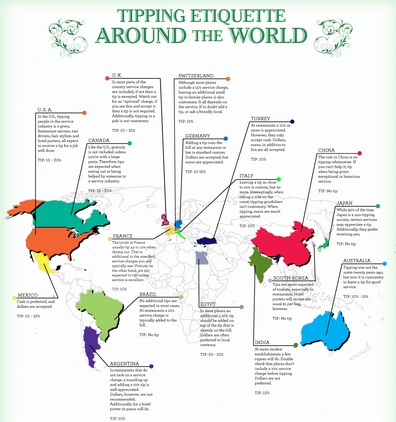Harish Manwani, COO of Unilever, makes a passionate argument about purpose and sustainability in top-level decision-making. He believes responsibility in “doing well and doing good by people” is the only way to run a 21st century business responsibly. He calls for businesses to stand for values and purpose rather than net profits.
Tag Archives: helpothers
Try walking through life as if material things are worthless.
Season of Life: A Football Star and a Journey to Manhood
I played with a dear friend at Penn who was also a “Gilman Boy.” His name is Brandon Copeland. Brandon was a three time all Ivy League football player as well as a solo captain on the 2012 Ivy League Champion Football Team. He currently plays for the Tennessee Titans.
Mint.com put together a great infographic on tipping around the world. Zoom in and check it — Travel.
How much to tip around the world
Curing The Curse of Knowledge
How can you teach and share if you can’t communicate effectively? The Curse of Knowledge occurs when one forgets what it’s like not to know something. This presents a serious communication obstacle for leaders, educators, communicators, and lucid practitioners who wish to help others.
Consider the yoga teacher who is teaching the first time student. Does the teacher have the empathy to remember what it feels like to practice for the first time?
How about the founder/CEO of a startup company? He’s been working on his business for 10+ years and knows every intricate detail. When he’s delegating responsibility, does he remember what it’s like to not know as much as he knows?
In Made to Stick: Why Some Ideas Survive and Others Die, Chip and Tom Heath say that the curse of knowledge is inevitable. But is it really?
The Heaths argue that we tend to communicate and teach as if we were the intended audience. Does this have to be the case? Let’s look to yoga for the answer.
In the 2nd limb of Yoga, Niyama, there are 5 Niyamas or self duties.
One duty is Svādhyāya or self study. Svādhyāya teaches us to diligently track our progress. By keeping a journal, writing a blog, and tracking our learning, we can look back and study our old selves in order to remember what it was like to “not know.” Armed with this knowledge, we can empathize with those we teach and thus provide better lessons, making the world a better, more lucid place.
You know things that others don’t.
You want to share your knowledge and experiences to make the world a better place.
Svādhyāya is one way to make sure we remember what we did not know. What are some other ways to ensure that we remember what it was like not to know?
~TR


